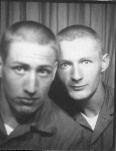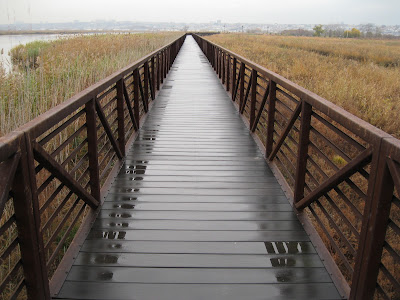Chapter42 – Bound for Denver
Half the day seemed gone by the time the bus pulled out of
the terminal in Salt Lake City, although in truth, the day had started so early
for me that the break had barely dented the morning much -- commuter traffic
still thick enough in the center of town to slow the bus to a crawl at each
traffic light as it made its slow way to what was to become Route 40 East.
Signs showed for Herber City and Deep Creek, neither name
meaning much to anyone on the bus, and certainly not a destination for the
group we picked up while waiting, a strange lot of characters that made the Las
Vegas bound group seem tame. Nearest me, in a seat one back from mine and
across the aisle, was the largest man I had ever seen -- not fat, not even
overly tall, just large, his hands and face and chest twice the size of mine,
and his body barely fit into the double seat, taking up too much room for
another passenger to sit beside him, unless that second person was half my size
and thin as paper.
I might not have noticed him in my self-reflective mood had
he dressed more or less like the rest of the passengers, but this huge man wore
cowboy gear -- not the t-shirt and torn jeans I'd seen pickup truck cowboys
wearing along the road, but the glitter and rhinestone typical of 1930s movies,
his gold and white shirt so encrusted by these shards, he jingled as he made
his way to his seat. His pants were just as gawdy, starting at his waste with
an engraved leather belt as out of proportion to him as he was to the bus seat,
as thick as my arm and carved with what reported to be American Indian symbols
-- though I was unwilling to bet on their authenticity. The pants themselves
bore the same glitter as the shirt, although mostly located in large stripes
down each seam, until the pants parted slightly at the bottom in a flair,
leaving a delta of slightly darker fabric around which the rhinestone made
their way to his boots. The boots, too, had the same coordinated color of gold
and white, though they had suffered several calamities in his travels so as to
leave them slightly scuffed in places.
Of all, the hat proved most appalling, so large, so white
and so studded with stones, he could hardly hold it on his head without his
neck knelling under its weight. He continually seemed to nod, struggling
against gravity, yet refusing to remove the cause -- some inner determination
resisting even the temptation.
I knew nothing about the man, nor did I talk to him, keeping
company with the rest of the passengers, all of whom seemed to find him too odd
even in a part of the country where strange things accosted people routinely.
Still, I wondered about him, and glanced back frequently when the landscape
outside the bus grew uninteresting, and sometimes, even when the world outside
offered comparable attractions. Where was he going? What was he dressed up for?
Could he not tell how odd he seemed to other people? Or perhaps, I concluded,
when a man grew to a size such as his, he could cease caring about what other
people thought and do just what he pleased.
The huge cowboy posed far less annoyance than a much smaller
character seated a few seats up on that side of the bus, a mouse-like little
man with a nose as out of proportion to his face as the cowboy was to the rest
of us, sniffing constantly, snorting back congestion with such utter disregard
for the listening comfort of the other passengers, that he drew attention despite
our seeking to avoid him.
While much more normally dressed than the cowboy, this small
figure's clothing seemed to hand loosely on him, as if he was too slippery for
clothing to cling, and a sudden move might project him out from his shirt and
pants at any moment. He seemed restless, too, constantly shifting in his seat,
as if he couldn't find a precise angle so he could rest, and for miles, he
shifted and snorted and coughed, wiping his wet nostrils on the sleeve of his
dirty denim jacket.
From where I sat, I could only just make out his features,
catching sight of his narrowed eyes when he glanced nervously out the window on
my side of the bus. Perhaps his huge nose created the illusion, but his eyes
seemed incredibly small and close together -- and so nervous, he blinked
constantly, and continually glanced away from the thing he looked at. Just
watching him made me jittery, and I struggled to keep my attention focused
outside, when not on the cowboy.
Despite complaints from several other people on the bus, a
man behind me, whom I could not see, kept up a persistent stream of cigarettes,
the smoke of which cascaded over my seat and down the aisle, so steady a flow
that many people cracked windows to let the smoke out, thus lowering the
temperature of the bus' interior just as we rolled into a region where winter
reigned, mountains climbing high around us on either side.
One brief moment of panic overcame me when I glanced out the
window and saw the all too familiar sign depicting Route 80 East, and realized
the bus rolled along a roadway that -- 2,200 miles later -- would pass within
blocks of my family's house on the border of Paterson, a roadway that I had
wandered as a kid during its construction, begging sips of water from
construction workers' coolers, watching as the big cranes laid down huge slabs
of concrete and steel to make up the bed of the extended bridge over blocks of
city.
It was a terrible moment, bringing back the panic I had felt
on the New Jersey Turnpike or the trip West -- only now, instead of staring
over my shoulder to determine if someone followed, I felt drawn towards that
distant destination, doomed to return to justice -- as if my pockets were
filled with lumps of metal and Paterson a huge magnet pulling me along.
I kept thinking I needed to get off the bus, to forget this
side trip to meet Louise, to forget everything except my hiding -- keeping
myself to that dismal room in East L.A. where no one could find me.
The unreasonable fear passed only when the bus finally made
its turn off Route 80 and onto a lesser highway Route 40, who winding ways did
not so directly connect with the East, and whose signs boasted of a less
distant Denver for which I had paid my fair to reach.
The route we travelled took the bus along the northern most
rim of a great plateau, an elevated table of remarkable landscape most of which
we would not see. The plateau was as large as the state of California with an area
at its center called Four Corners -- this marking the place where Utah,
Arizona, New Mexico and Colorado met. In some ways, this trip mirrored the trip
I had taken to reach L.A., our bus traveling East on the exact other side, and
in my mind (with a telescope of massive proportions), I could see myself in the
Westwardly bound bus weeks earlier traveling West along the most southerly side
of the plateau.
Our route, however, took us nowhere near the more dramatic
features of the plateau, trading the magnificent buttes that dressed up the
central parts of that magnificent landscape for hillsides filled with more
traditional rocks and trees, as we crossed into the Rocky Mountains at a point
when the world became less alien. At the most strange, the plateau broke up
into canyons and rock formations better suited to the surface of Mars than any
place on earth I could have imagined, while the area we traveled now had its
moments of incredible beauty, they seemed extremely earthbound, and indeed, struck
me as the height of any nature I might have sought, competing even with the
remarkable landscape I would encounter in Oregon when I made my way there later
in the year.
At some point during this part of our drive, someone behind
me managed to squeeze open one of the windows, letting in a stream of cool, dry
air -- this filled with a flavor so strongly loaded with the smell of pine and
earth, I didn't even mind the chill, sucking in the remarkable flavor so as to
wake me from the doze I had suffered since arriving and leaving Los Angeles.
Protected by the bus and its churning header, I felt as I had as a child when
staring out at a furious thunder storm, protected, yet allowed to experience a
bit of the reality I witnesses. Again, the urge struck me to exit the bus, not
to escape some fate I imagined for me in the East, but to get a fuller sense of
the place through which I passed.
Alas, this would have to wait until another time. The bus
plunged on, unabated by my wishes.
As we neared the Wasatch Mountains signs showed more
frequently for Herber City, Charleston, Midway and Deep Creek, highway seeming
to take advantage of a ripple in the vast mountains to avoid the harder climb
directly east, easing through Herber Valley before making the turn towards
Colorado. Even then, it was not a direct turn east, following a highway that
had followed trails laid down thousands of years earlier by the Native American
Indians, whose footsteps had learned the natural curvature to the land so as to
avoid the pointless and tedious task of climbing when unnecessary, traveling
further along softer soils than toiling up mountains for a shorter, more
burdensome trip.
Indian trails, however, had given way to interstate highways,
so that sections of slice stone showed where state contractors had blasted in
order to widen the space for more modern transport, with even the lanes of
highway in some spots struggling to contain the thick girth of tractor trailers
and buses like ours.
Heber City, surprised me, popping up in the middle of what
turned out to be a farming valley between the Wasatch and Uinta mountains. It
had motels and gas stations and even a small downtown, through which I saw
numerous pickup trucks, and jeeps -- many of the vehicles parked before restaurants
and motels had ski racks attached, or back seats filled with camping equipment.
We passed on, the dreary sky between mountain peaks
suggesting snow, making me fearful again that we might find ourselves stranded
in communities even smaller than the 5,000 estimated people living in Heber
City.
The characters, smoke and other distraction inside the bus
-- as well as an overall weariness of traveling -- made me appreciate less the startling
views passing the windows on either side of the bus.
When people of the region finally got to marketing their
natural resource here years later, this part of the country would be called
"Mountain Land," a region extending eastward from the Salt Lake
County line to include the eastern slope of the Wasatch Mountains. Through it
the Provo River flowed at the southern end of the range, emptying into Utah
Lake. North of us, Mountain Land rose up from the Provo River to the Upper
Weber River Valley -- leaving in between the vast bulk of the Uinta Mountains,
the peaks of which reached 13,000 feet above sea level and encompassed some of
the last pure wilderness this side of Alaska.



Comments
Post a Comment